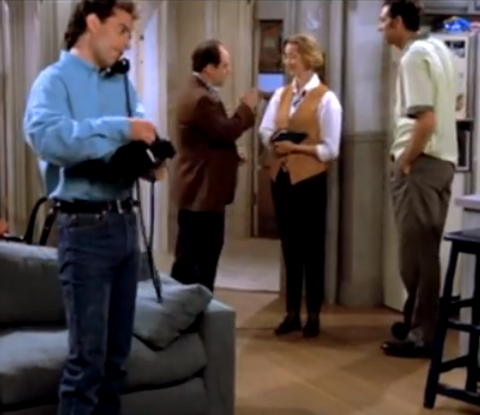
‘Seinfeld’ gets a phone call: ‘Hi. Would you be interested in switching over to TMI long-distance service?’ the telemarketer asks. ‘Oh, gee, I can’t talk right now,’ Jerry responds, ‘Why don’t you give me your home number and I’ll call you later?’ To which the telemarketer replies: ‘Well, I’m sorry, we’re not allowed to do that.’ (For remainder of the conversation — and Seinfeld’s punchline — click beneath caption of photo below.)
FUNDRAISERS FOR NONPROFIT ORGANIZATIONS
DESERVE SLIGHTLY BETTER CONSIDERATION,
ALTHOUGH THEY CAN BE ANNOYING ALSO
Never pledge money over the phone;
resist giving out credit card numbers;
don’t cave-in to salesmen’s pressure
DONATIONS SHOULD NOT BE LIMITED
TO FINANCIAL CONTRIBUTIONS ONLY
By David Maril
Even though it’s a new year and tax deductions for 2013 are history, the phone calls for giving continue to arrive early and often.
It’s gotten to the point where it seems the only reason landline phones have not been completely replaced by smartphones is they are needed to deliver pain-in-the-neck marketing and fund- raising calls.
“How much can we count on you to pledge?” the voice on the other end of the telephone asks.
The do-not-call list, which seems to be losing its effectiveness in protecting us from unwanted solicitations, never did apply to nonprofit organizations and political campaigns.
Many nuisance marketing clowns duck around calling restrictions by claiming you have a prior business connection with their company or organization.
Those companies that tie up phone lines with recorded messages about bailing you out from paying off high interest rates should be locked up for credit fraud. The same goes for the companies that deliver crazy messages about expiring vehicle warranties to some people who don’t even own a car.
We should be a little more tolerant of nonprofit fundraisers. But often, calling between 5 and 7 p.m., they can be annoying and misleading as well.
Are they really who they say they are?
The phone will ring and you’ll be greeted by hearing the pronunciation of your name, butchered — even if it’s Smith. And at the end of the sales pitch, a “Can we rely on your support for $50 or $100? For $300 you are a ‘gold-circle member’ and receive special recognition.”
If you are a college graduate, fundraising pleas have become a condition of receiving a degree. Some of us are even bombarded by fundraising efforts from our high schools. Calls also come in for support of charities, research to cure diseases, youth organizations, police associations, animal welfare and political causes.

‘Seinfeld’ gets a phone call, Part 2: ‘Oh, I guess you don’t want people calling you at home?’ Jerry inquires of the elemarketer. ‘No,’ he replies. For conclusion of the conversation — and Seinfeld’s classic punchline — click link (highlighted in yellow) immediately below.
NEVER PLEDGE MONEY OVER THE PHONE
One rule I strongly believe in is, never pledge money over the phone. And, even more importantly, don’t give out credit card numbers.
If you are interested in giving, insist the organization mail material you’ll have a chance to read and can research before promising financial support. There are too many scams going on and it’s unwise to make a donation strictly on the basis of what a fast-talking voice has pitched over the telephone.
Before making a donation, I want to know what percentage of the money goes to the charity. I think it’s pretty suspicious when my caller ID shows that a person who says he’s raising money for my local police force is pestering me all the way from Florida.
Support is too often equated strictly with the size of the figure written on the donation check. What’s forgotten is that $10 from a financially strapped person may be a more significant gesture than $1,000 from a millionaire.
CLICK HERE FOR VIDEO OF JERRY SEINFELD RESPONDING ON PHONE TO TELEMARKETER
Not enough organizations encourage people to donate their time instead of simply sending checks. The emphasis is on money, and too many development people and fundraisers make it difficult to learn about more personal and gratifying non-financial options of support.
Twenty-five years ago, I was more than happy to do something for Clark University, in Worcester, Mass., my old college. However, the amount of money I could afford to give them as a working newspaper person didn’t amount to much. So the last time they called for money, I told them that at the time, I wasn’t living very far away from campus and instead, I’d prefer to volunteer for a day to come over and do something hands-on.
During the first decade after I had graduated, Clark held a career-day program where they’d invite alumni from different work fields to come up and spend the day meeting students and talking about their fields and professions.
I participated in that, answering questions about newspaper work, for as long as they had the program. It was interesting meeting the students and getting a feel for how things were on campus.
I was more than happy to volunteer my time, and when I left the school at the end of the day, I felt I had done something helpful for the college and was staying connected with the university.
NEW ADMINISTRATORS TOOK OVER AND ENDED PROGRAM
The program seemed popular, with hundreds of students attending each year. But one year, new career and planning administrators took over and ended the program. For the last 25 years, there’s been nothing, except frivolous reunion programs, to draw any of us back to the campus.
So when they continued calling me and asking for money, I’d tell them to focus their requests on the wealthy alumni who live out of the area. These are the people who can afford to make major donations and are too far away to spend a day or two on campus.
I told them emphatically I was not writing out any checks. But if they gave me the opportunity, I’d be glad to come up for a day or two and participate in a project to help the students and the college.
Since I made this offer 25 years ago, they have not called — even to ask for money.
davidmaril@hermanmaril.com
“Inside Pitch” is a weekly opinion column written for Voice of Baltimore by David Maril.
CHECK OUT LAST WEEK’S “INSIDE PITCH” COLUMN: click here
…and read previous Dave Maril columns by clicking here.






January 25th, 2014 - 9:03 PM
[…] OUT LAST WEEK’S “INSIDE PITCH” COLUMN: click here …and read previous Dave Maril columns by clicking here. Filed under: Top Stories […]